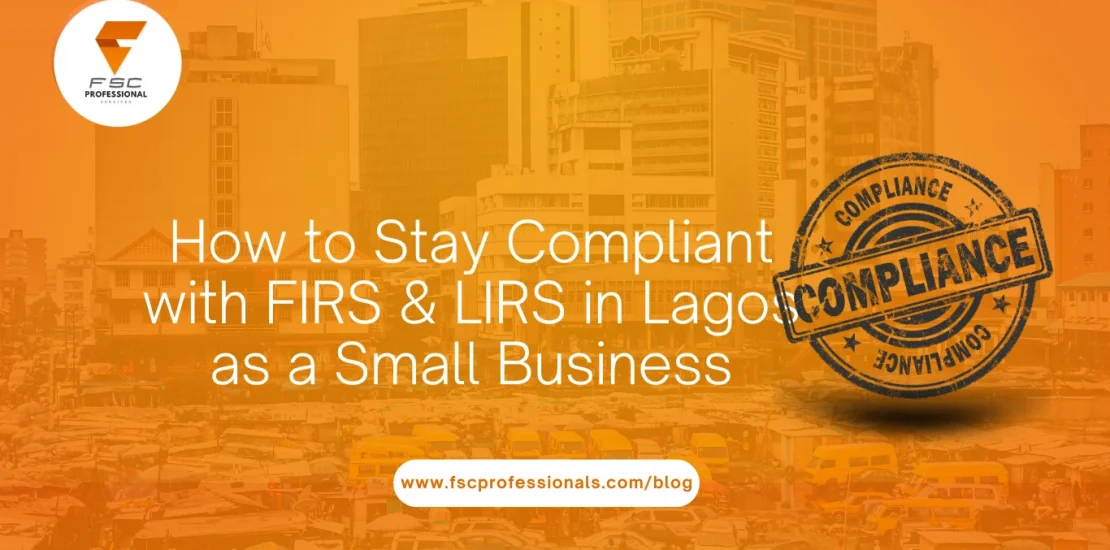- June 3, 2025
- Posted by: admin
- Category: Resources

Running a small business in Lagos comes with its fair share of opportunities and challenges. Among those challenges is navigating the complex world of taxes. Between the Federal Inland Revenue Service (FIRS) and the Lagos State Internal Revenue Service (LIRS), staying compliant is a critical part of protecting your business and ensuring sustainable growth.
For many Lagos-based SMEs, tax compliance can feel overwhelming, with multiple monthly and annual filings, different forms, and complex regulations to follow. But here’s the thing: tax compliance isn’t just a legal requirement—it’s a crucial part of running a successful and respected business in Nigeria’s economic hub.
In this comprehensive guide, we’ll break down how to stay compliant with FIRS and LIRS in Lagos as a small business. We’ll cover the most common compliance mistakes, differences between monthly and annual filings, how to prepare your records, what to expect during a tax audit, and how FSC Professionals can support your business every step of the way.
From Hustle to Enterprise: A Practical Guide to Financial and Tax Management for Nigerian MSMEs
Common Compliance Mistakes Lagos-Based Small Businesses Make
First, let’s talk about the common mistakes that catch many Lagos SMEs off guard.
Failure to Register on Time
Many small businesses operate informally for months—sometimes years—without registering with FIRS or LIRS. Every business with an annual turnover above the tax threshold must register and obtain a Tax Identification Number (TIN). Failure to do so attracts fines and may even risk closure.
Inaccurate VAT Returns
VAT (Value Added Tax) is mandatory in Lagos, and many businesses either charge VAT but fail to remit it or miss the monthly deadline. VAT collected must be submitted by the 21st of the following month—failure to comply can lead to significant penalties.
Neglecting PAYE
If you have employees, Lagos law requires you to deduct and remit Pay-As-You-Earn (PAYE) monthly. Some businesses deduct PAYE but fail to remit it to LIRS on time, which can result in fines and compliance issues.
Overlooking Withholding Tax (WHT)
WHT applies to payments made to contractors and vendors. Many Lagos businesses either forget to deduct WHT or fail to remit it properly, leading to compliance risks and potential audits.
Avoiding these mistakes is key to maintaining a healthy relationship with tax authorities and avoiding costly penalties.
Monthly vs. Annual Filings: Know Your Lagos Deadlines
Tax compliance in Lagos isn’t just about paying what’s due; it’s about meeting all filing deadlines to avoid penalties and audits.
Monthly Filings
-
VAT Returns: File and pay by the 21st of the following month.
-
PAYE: Remit deductions to LIRS by the 10th of the following month.
-
WHT: Must also be remitted monthly by the 21st.
Annual Filings
-
Companies Income Tax (CIT): File annual returns within six months after the financial year ends.
-
Personal Income Tax Returns: Sole proprietors and partners must file with LIRS by 31st March each year.
Missing these deadlines can lead to interest, penalties, and potential reputational damage.
Document Retention & Audit Preparation in Lagos
LIRS and FIRS both have the authority to audit your business at any time. Proper record-keeping is your best defence.
Key Documents to Keep:
-
Sales Day Book: Records daily sales, critical for VAT calculations.
-
Cash Book: Tracks cash in and out—essential for reconciliations.
-
General Ledger: Summarises all accounting transactions.
-
Payroll Records: Evidence of PAYE deductions and remittances.
-
Bank Reconciliation Statements: Aligns cash book with bank statements.
-
Invoices and Receipts: Validate business expenses and income.
Keep records for at least six years, as recommended by FIRS guidelines and local best practices.
What Happens During a Tax Audit in Lagos?
Hearing the word “audit” can send shivers down any business owner’s spine. But audits are a standard part of tax compliance in Lagos. Here’s what to expect:
- Notification: LIRS or FIRS will issue a formal notice indicating the audit.
- Document Request: They’ll request relevant financial statements and tax returns.
- Field Visit: Auditors may visit your premises, review your documents, and ask questions.
- Findings & Report: After the audit, you’ll receive a report outlining discrepancies, tax liabilities, and possible penalties.
- Resolution: You’ll have a chance to clarify findings and settle any obligations.
Being prepared—and having your records in order—can make an audit a straightforward process rather than a nightmare.
How FSC Professionals Help Lagos SMEs Stay Compliant
At FSC Professionals, we know that Lagos is Nigeria’s business heartbeat, and compliance is key to success here. We help small businesses:
- Register & Stay Setup: Get your TIN, VAT certificates, and PAYE remittance structure sorted with FIRS and LIRS.
- File Monthly & Annual Returns: We handle all your filings, VAT, PAYE, CIT, so you never miss a deadline.
- Manage Your Records: We organise your books and digital records for easy audits.
- Defend During Audits: We represent you during audits, respond to queries, and help resolve issues.
- Stay Informed: Tax laws change. We keep you up to date and ensure you leverage all available tax incentives.
Conclusion: Stay Compliant, Stay Confident
Understanding how to stay compliant with FIRS & LIRS in Lagos as a small business is a vital step towards financial stability and growth. It’s not just about ticking boxes, it’s about protecting your brand, maintaining trust with clients and investors, and building a business that can thrive long-term.
At FSC Professionals, we make compliance easy. Let us handle the complexities so you can focus on running and growing your business.
📞 Ready to simplify your tax compliance in Lagos? Contact us today and let’s get started!
